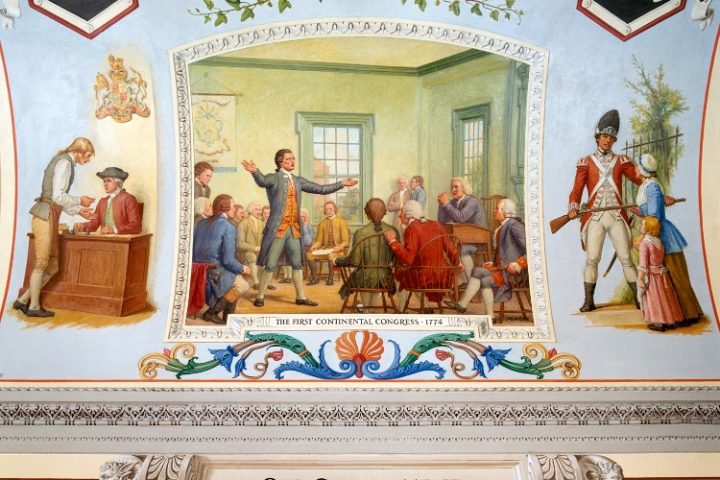
On an autumn day in 1774 that, according to records kept, was already quite chilly, a significant moment in American history was about to unfold. In the heart of Philadelphia, the First Continental Congress had gathered at Carpenters’ Hall, united by a common cause — their growing discontent with British tyranny and the disregard by Parliament and King of their many redresses.
As the delegates, representing 12 of the 13 American colonies, assembled, there was an air of tension, resolve, and a touch of trepidation in the room. These men, from different walks of life and backgrounds, had journeyed from far and wide. Some were lawyers, others farmers, and still more merchants, yet they all shared an unyielding determination to confront the oppressive measures imposed by King George III’s government, measures known to history as the Intolerable Acts.
The Intolerable Acts, also known as the Coercive Acts from the British perspective, were a series of punitive measures imposed by the British government on the American colonies in response to growing Colonial resistance and the Boston Tea Party. These acts included:
Boston Port Act: This act closed the Port of Boston until the damages from the Boston Tea Party were paid for. It severely impacted the economy of Boston, as the port was a vital trade hub.
Massachusetts Government Act: This act altered the Massachusetts charter and reduced the power of the colonial legislature while strengthening the authority of the royal governor. It aimed to increase British control over Massachusetts.
Administration of Justice Act: Often called the “Murder Act,” it allowed British officials accused of capital crimes in the colonies to be tried in Britain, where it was believed they would receive a more sympathetic trial.
Quartering Act: This act expanded the Quartering Act of 1765, requiring colonists to provide housing and supplies to British troops in unoccupied buildings, including private homes, if necessary.
Quebec Act: Although not directly related to the other Intolerable Acts, it was passed around the same time. The Quebec Act extended the boundaries of Quebec into the Ohio Valley, which was a source of concern for many American colonists.
I would draw the readers attention not to the black letter of those acts, necessarily, but to their overall tone and intent. Then, I would ask: Are we being burdened by the enactment and enforcement of our own slate of Intolerable Acts?
These acts were deeply resented by the American colonists and were seen as a direct infringement on their rights and liberties. They played a significant role in escalating tensions between the colonies and the British government, ultimately leading to the outbreak of the American Revolutionary War.
For weeks, impassioned debates echoed within the hallowed walls of Carpenters’ Hall. Men such as Patrick Henry, George Washington, John and Samuel Adams, John Jay, and John Dickinson argued fervently for their rights and liberties. They penned a series of resolutions and statements that would eventually become known as the Declaration and Resolves of the First Continental Congress.
The full text of the Declaration and Resolves can be found here, but for the sake of brevity, here are a few of the resolutions, chosen particularly for demonstrating the deep-seated love of liberty and self-government possessed by these patriotic statesmen.
That the inhabitants of the English Colonies in North America, by the immutable laws of nature, the principles of the English Constitution, and the several Charters or Compacts, have the following Rights:
That they are entitled to life, liberty, and property, and they have never ceded to any sovereign power whatever a right to dispose of either without their consent.
That our ancestors, who first settled these Colonies, were at the time of their emigration from the mother country, entitled to all the rights, liberties, and immunities of free and natural born subjects, within the Realm of England. [N.B.: Colonists considered this their right per Paragraph 63 of the Magna Carta of 1215]
That by such emigration they by no means forfeited, surrendered, or lost any of those rights, but that they were, and their descendants now are, entitled to the exercise and enjoyment of all such of them, as their local and other circumstances enable them to exercise and enjoy.
That the foundation of English Liberty, and of all free Government, is a right in the people to participate in their Legislative Council: and as the English Colonists are not represented, and from their local and other circumstances cannot be properly represented in the British Parliament, they are entitled to a free and exclusive power of legislation in their several Provincial Legislatures, where their right of Representation can alone be preserved, in all cases of taxation and internal polity, subject only to the negative of their Sovereign, in such manner as has been heretofore used and accustomed.
On that momentous day, October 14, 1774, the Congress, after much deliberation, put their signatures on this historic document. It spoke of their desire to remain loyal to the British Crown, but not at the cost of their unshakable commitment to the principles of liberty and self-governance. These principles would lay the foundation for the American Revolution and the birth of a new union of states.
As the ink dried and the gavel fell, the sound of unity rang through the hall. The Declaration and Resolves sent a powerful message to the British Parliament: The American colonies would not bend to unjust laws and taxation without representation. Instead, they stood together, prepared to face the challenges that lay ahead.
The story of the First Continental Congress and the issuance of the Declaration and Resolves on that fateful day is a testament to the indomitable spirit and determination of those who dared to defy tyranny and set in motion an armed struggle for independence that would ultimately lead to the birth of the 13 sovereign republics of the United States of America.



